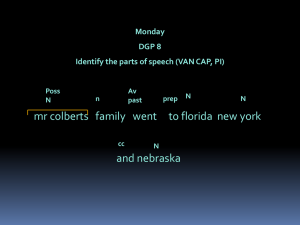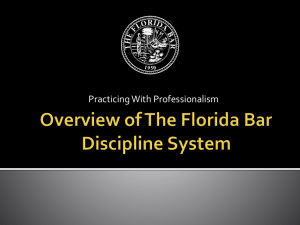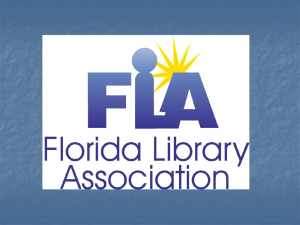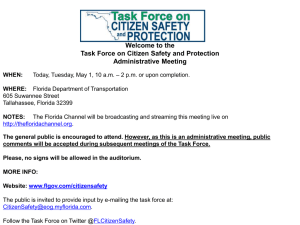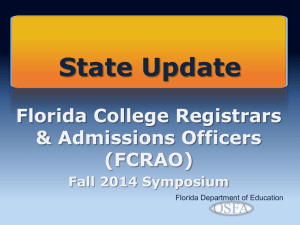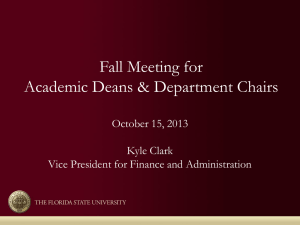2.4 MB ppt - State University System of Florida
advertisement
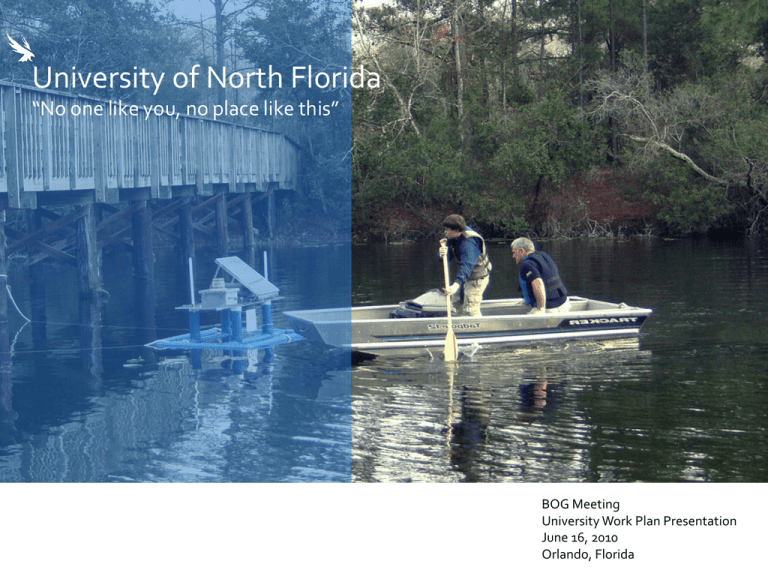
University of North Florida “No one like you, no place like this” BOG Meeting University Work Plan Presentation June 16, 2010 Orlando, Florida University of North Florida Current Profile Mission: The University of North Florida fosters the intellectual and cultural growth and civic awareness of its students, preparing them to make significant contributions to their communities in the region and beyond. Enrollment (fall 2009): Current UNF Data 16, 719 (89.1% undergraduate) Number of degrees granted (2008-09) 2,892 Bachelor’s, 586 Master’s, 33 Doctoral Endowment value: $71 million Economic impact: $1 billion annually “No one like you, no place like this” – learning-centered environment, vibrant student life, relevant graduate educational opportunities, Transformational Learning Opportunities A steward of place – generating intellectual, cultural, economic capital for the region and the state Core Strengths Flagship programs in Community Nursing, Transportation & Logistics, International Business, Coastal Biology Centers and Institutes including Taylor Research Institute, Center for Global Health & Medical Diplomacy, Environmental Center, Small Business Development Center, Florida Institue of Education Faculty and student research projects aligned with New Florida initiative: Deployment of Innovative Sensors, Military Laptop Fuel Cell Power Supply, Weather Research (combined 18.5 million) Institutional Peers UNC Charlotte, Portland State University, Towson University Page 1 University of North Florida Future Directions Vision: The University of North Florida aspires to be a preeminent public institution of higher learning that will serve the North Florida region at a level of national quality. UNF Work Plan Projected Growth 5-10 Year Goals Institutional Aspirants As Florida emerges in the next few years as the nation’s third largest state, overtaking New York, the University of North Florida will renew its commitment to offer a singular undergraduate experience, strengthen its commitment to provide relevant and needed graduate programs, and purposefully intensify research activity in support both of undergraduate and graduate education and the discovery and application of knowledge. UNF Student Enrollment : 25,000 – 30,000 capacity Jacksonville Population: State of Florida Population: 1.7 million (Yr 2020 rank: 37th for 250 metro areas) 22.5 million (Yr 2020 3rd most populous state) Improved completion rates & number of degrees Reduction in class size & student-faculty ratios Increased educational opportunities in STEM areas New regionally appropriate master’s & doctoral programs Expanded aid & programs (Jacksonville Commitment Program) Recruitment of talented faculty & collaborative research initiatives with local industry Development of new patents & technologies, increased federal expenditures Appalachian State University, James Madison University, Miami Univesity – Ohio Montclair State University, The College of New Jersey University of Maryland – Baltimore County, UNC Wilmington Page 2 University of North Florida Campus Map 2010 Page 3 University of North Florida System Goals New Florida Goals “The global driver of economic prosperity centers on the knowledge, innovation, and talent that is produced by strong public universities from this point forward.” Measure 2008-09 Peer-Aspirant Average Target (2013-14) Freshmen retention rates 78.6% 84.6% 82% Six-year graduation rates 48.1% 65.1% 49% Number of degrees awarded (Bachelor’s, Master’s, Doctoral) 3,511 3,516 4,369 Percent Bachelor’s degrees awarded (Pell) 29.4% 34.4.% (SUS) 29.9% Percent Bachelor’s degrees awarded (Black) 9.6% 13.1% (SUS) 10.8% Percent Bachelor’s degrees awarded (Hispanic) 5.8% 17.8% (SUS) 8.1% Percent Bachelor’s degrees awarded STEM, Health, Education 23% 24% (SUS) 24% Percent Graduate degrees awarded in STEM, Health, Education 19% 41% (SUS) 23% Total 2008 academic research and development expenditures $13,966,175 Percent revenue from grants & contracts $17,229,003 $20,390,000 7% Total research expenditures as a percentage of total expenditures 10% 8.5% 2% 5% 5% Page 4 University of North Florida Moving the “Needle” UNF Goal 1: Enrich the learning environment and provide support to assure student success Specific Actions: Expand undergraduate advising Increase number of faculty Expand distance learning Measure 2008-09 Peer-Aspirant Average Target (2013-14) Student-Faculty ratio 21:1 17.8:1 20:1 Student-Advisor ratio (lower division) 436:1 NA 411:1 Student-Advisor ratio (upper division) 425:1 NA 432:1 % Classes under 20 21% 35% 31% % Student credit hour taught by full-time faculty 78.2% 68.2% (SUS) 81.4% Number of distance learning courses 112 NA 180 Centralized IT funding per student fte (2007) $916 NA $1100 Page 5 University of North Florida Moving the “Needle” UNF Goal 2: Increase access and diversity Specific Actions: Increase need-based scholarships Increase merit-based scholarships Expand Jacksonville Commitment Program Measure Percentage of underrepresented students 2008-09 Peer-Aspirant Average Target (2013-14) 23% 26% First-year retention rates among blacks & Hispanic population 24% 83% & 74% 85% & 80% Six-year graduation rates among blacks & Hispanic population (2007) 37% & 47% 56% & 61% 42% & 52% Entering SAT scores 1110-1270 1021-1217 1150-1280 Percent international students 2% 3.2% 3% Average annual total need-based aid scholarships per FTE $305 $967 $500 Number of non-need-based scholarship awardees 376 NA 409 NA Page 6 University of North Florida Moving the “Needle” UNF Goal 3: Advance basic and applied research Specific Actions: Target funding for Taylor Research Institute to advance coastal and estuarine engineering Recruit faculty to high-potential programs Provide adequate resources for graduate and research programs Deepen electronic and print library resources Measure 2008-09 Peer-Aspirant Average Target (2013-14) Number of graduate programs 28 56 32 Total library expenditures per student FTE (2007) $275 $447 $300 Federally financed academic R&D expenditures (2008) $7,294,000 $6,396,875 $10,648,919 Number of new contracts & grants 92 NA 112 Page 7 University of North Florida Student Enrollment Enrollment Plan 2010-11 Funded (full-time equivalents) Category Total FTE 2010-11 Funded 10,000 Enrollment Projections 2010-2015 (full-time equivalents) Category 2010-11 Estimated 2011-12 Estimated 2013-14 Estimated 2015-16 Estimated 5-Yr Projected Average Florida Resident 9,669 9,870 10,284 10,744 2.13% Non-Resident 499 509 530 555 2.13% Lower 3,820 3,877 3,994 4,115 1.5% Upper 5,348 5,482 5,759 6,051 2.5% Total Grad I 870 887 923 961 2.00% Total Grad II 130 133 138 172 5.98% Total FTE 10,168 10,379 10,814 11,299 2.13% Page 8 University of North Florida New Degree Programs (potential) Academic Programs PhD in Coastal Engineering and Management MS in Materials Science MS in Transportation & Logistics MS American Sign Language/Interpreting DrPH Public Health MS in Social Work New Degree Programs (on master plan) Proposed BOT Approval Date Level CIP Code Title Proposed Implementation Date June 24, 2010 M 51.3101 Nutrition & Dietetics Fall 2010 January 2011 B 50.0703 Art History Summer 2011 January 2011 B 51.3101 Nutrition & Dietetics Summer 2011 January 2011 B 38.0201 Religious Studies Fall 2011 January 2012 PSM 03.0103 Environmental Management Fall 2012 January 2013 MM 50.0903 Music Fall 2013 Page 9 University of North Florida Resources Needed Request for Support Assumptions The fulfillment of UNF’s mission and the pursuit of its institutional aspirations are contigent upon the acquisition of sufficient resources from a combination of sources. Total funding needed: $7,035,978 ($6,575,978 recurring) State funding New Florida Plan Academic Enhancement Fee Tuition Differential Fee Capital Campaign Actions Restoration of 23 faculty lines - $1,243,590 Advising (staff, programming) - $793,180 Student Life programming - $471,253 Expansion of distance learning - $774,655 Need-based support (staff, programming) - $459,800 Increased research capacity: •Taylor Research Institute & Coastal Bio - $1,791,500 ($450,000 non-recurring) •Supplemental start-up funding •Increase faculty (10 new lines) in BOG identified strategic areas of emphasis - $702,000 •Increase graduate student support - $265,000 Faculty development (library, programming) - $510,000 Increase support of community engagement activities and Transformational Learning Opportunities - $235,000 ($10,000 non-recurring) Page 10 University of North Florida Request for Support Tuition Differential Tuition Differential Fee Proposal • UNF was not eligible to request tuition differential for 2008 7% increase • Alignment with Florida Statutes to address: $211.80 increase/30 credit hours • Access and greater production of degrees • Available courses and reduction of time-to-degree • Greater interaction between student and faculty • Improved instructional delivery to undergraduates Tuition Differential 70% Undergraduate Education Fund additional 18 faculty lines Fund 1 lab manager Number of course sections added: 139 Expected outcomes: increased course offerings, decrease in excess hours, overall graduation rates, student-faculty ratio $7.06 increase/credit hour Total new revenue generated 2010-11: $1,824,978 Total revenue 2009-2011: $2,933,883 Salaries + Benefits = $2,053,718 Need-based aid = $880,718 Tuition Differential 30% Undergraduate Financial Need Fund Jacksonville Commitment Program (need-based aid) for students graduating from Duval County Public Schools Fund SWOOP Scholarships (need-based aid) for area high school students Fund need-based aid for undergraduate population Total number of additional students served: 133 Expected outcomes: access, increased graduation rates among underrrepresented population, strengthened advising for at-risk students Page 11 University of North Florida Academic Enhancement Fee Request for Support Academic Enhancement Fee Proposal UNF has not imposed a technology fee Implementation date: August, 2010 Funding priorities aligned with Student Government and Board of Trustee requests 5% increase Supports overall student success and Board of Governors strategic goals Persistence & Graduation Rates • Expand and restructure advising system Metric: First year retention rates, 4- & 5-year graduation rates Increase distance learning course offerings Metric: overall retention rates, 4- & 5-year retention rates, number of dl courses offered $4.78 increase/credit hour Total revenue generated: $1,883,320 Student Financial Support Transformational Learning Opportunity Scholarships Metric: student learning gains, overall retention rates Need-based financial aid funding Metric: first-year retention rates, number of students from underserved populations Additional course sections Metric: overall retention rates, 4- & 5-year graduation rates, s/f ratio, average class size Improved or expanded campus transition and leadership programs Metric: First-to-second year and second-to-third year retention rates Page 12

